Li Yongfeng leads villagers to plant TCM herbs
2024-10-13
Li Yongfeng is the head of Ruiyuan Agriculture Co., Ltd. and Xingmin Medicinal Herb Planting Professional Cooperative in Guidong County, Hunan province.
Speaking of Li Yongfeng, local villagers are full of praise for what she has done, saying that she has made the Chinese medicinal herbs industry more prosperous, provided a stable purchase price for villagers, and driven local villagers to become rich.
In the middle of autumn, it’s the time to harvest TCM herbs, and local villagers are busy harvesting and drying them.
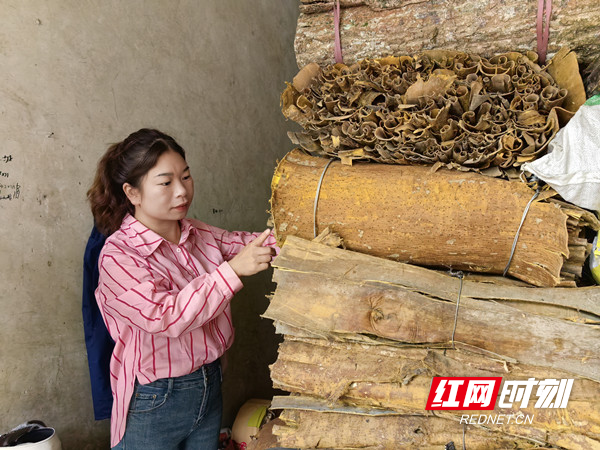
Guidong county is hailed as an important distribution center for TCM herbs in Hunan, Guangdong and Jiangxi provinces.
Li Yongfeng is 37 years old. Three generations of her family are engaged in the industry of Chinese medicinal herbs. Her father Li Junrong is renowned in this industry, with rich experience in cultivation and sales of medicinal plants.
Brought up in a world of herbs, Li Yongfeng had a strong interest in it and determined to follow in her father’s footsteps.
After graduating from university in 2008, Li Yongfeng resolutely returned to her hometown in Guidong county. Faced with the high-altitude climate and vast mountainous areas, she saw the huge potential of the Chinese medicinal herbs.
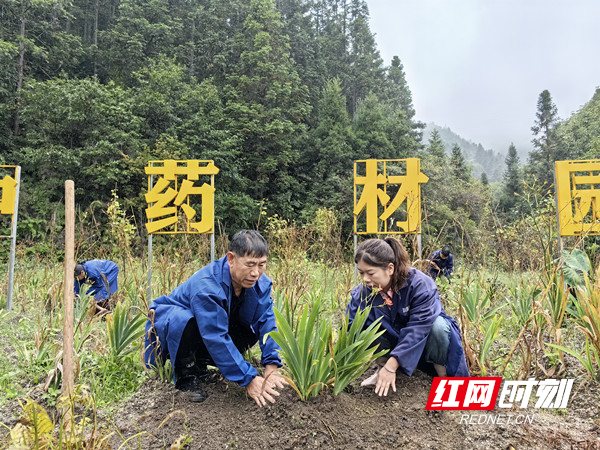
Therefore, apart from her father’s planting area of over 5,000 mu (333.33 hectares), she transferred over 2,000 mu (133.33 hectares) of land to plant medicinal herbs.
In addition to planting Chinese medicinal herbs with mature technologies such as cortex magnoliae officinalis and Rhizoma cimicifugae, Li Yongfeng boldly tried planting Gang Mei(Radix et Caulis Ilicis Asprellae) and raising Chinese medicinal herb seedlings.
However, Li Yonfeng’s father didn’t think it promising to plant Gang Mei, because wild Gang Mei nationwide has a large yield, which can already meet market demand, and there is no need to develop artificial cultivation anymore. Besides, there are so many other varieties of Chinese medicinal herbs that can be planted.
“Gang Mei is the main ingredient in the TCM formula of Ganmaoling, with a large and long-lasting demand. Currently, the country is vigorously promoting ecological civilization construction, and we cannot always rely on wild Gang Mei to obtain raw materials. Artificial cultivation is the inevitable path for the development of Gang Mei industry. I am willing to take the lead in developing it. If we want to make a difference in this sector, we must make innovation and breakthroughs,” said Li Yongfeng.
Apart from traditional planting methods, Li Yongfeng also introduced advanced planting techniques and management concepts to transform and upgrade the TCM planting bases. She also invited experts from Guangdong province to jointly develop Gang Mei planting technology.
In 2021, Li Yongfeng planted 15 mu (1 hectares) of Gang Mei seedlings for the first time. After sowing the seeds, she covered them with thin film and set up shading nets, carefully managing and protecting them.
However, after waiting for nearly three months, the seeds did not sprout, resulting in a loss of over 300,000 yuan.
But Li Yongfeng didn’t give up. After consulting experts in the trial planting base, she found that the cold climate in Guidong county is not suitable for early planting.
In 2022, Li Yongfeng boldly cultivated 20 mu (1.33 hectares) of Gang Mei seedlings.
Learning from her failure, she delayed planting for 45 days, removed the film cover and only used a sunshade net, strictly controlled the temperature and humidity of the base.
Two months later, the seeds sprouted and grew as scheduled. The trial planting was finally a great success.
Seeing her tenacity and boldness, her father no longer opposed her decision and joined her in the scientific planting, breeding, and management of Gang Mei and other Chinese medicinal herbs. They strictly control the use of pesticides and fertilizers to ensure the quality and safety.
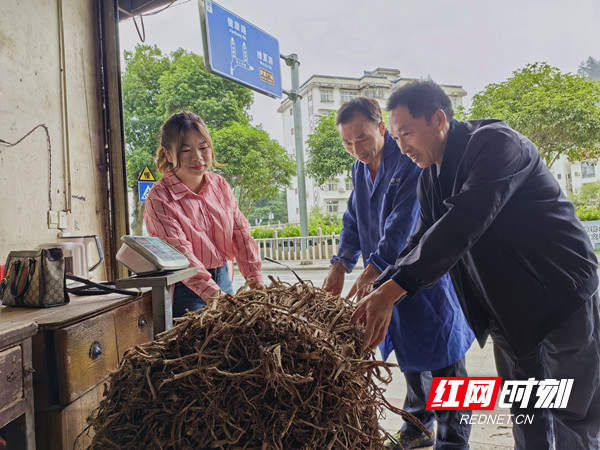
Li Yongfeng is deeply convinced that only by truly benefiting villagers can the traditional Chinese herb industry continue to develop.
In 2014, she established the Xingmin Medicinal Herb Planting Professional Cooperative in the county, with a business model of “cooperative+base+farmers”, closely integrating the cultivation of Chinese medicinal herbs with farmers.
She not only provides technical guidance and financial support, but also helps farmers solve sales problems, so as to ensure steady income growth.
Under her leadership, 260 farmers in the county have been engaged in planting traditional Chinese medicinal plants in the past decade.
In 2019, the cooperative was approved as a provincial demonstration park for modern agricultural industrial park in Hunan Province.
What’s more, Li Yongfeng conducted in-depth research on market demand, expanded sales channels, and gradually grasped the key links in the industrial chain like
cultivation, processing, and sales.
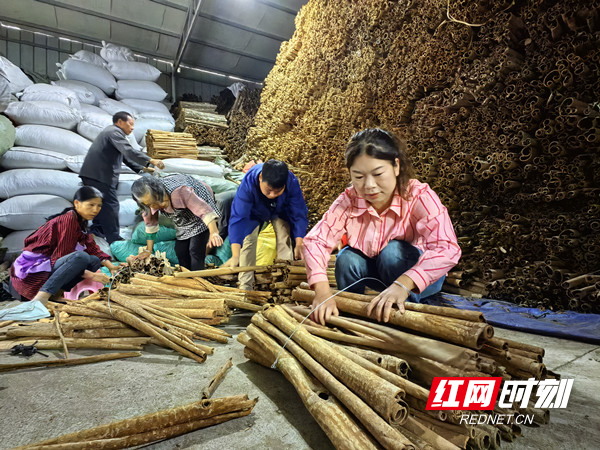
In 2018, she founded Ruiyuan Agriculture Co., Ltd. in Guidong County, focusing on the development of traditional Chinese medicine through the combination of authentic medicinal materials and characteristic medicinal materials, as well as long-term and short-term products.
The company has more than 50 employees, steadily involving 320 households and more than 80 varieties of herbs. It has built 3 standard planting bases and 1 processing plant, with a planting area of 7,000 mu (466.67 hectares), an annual output of over 300 tons, and an output value of over 15 million yuan.
Her traditional Chinese medicinal herbs industrial base was listed as a major project in Chenzhou City in 2021.
The Gang Mei planting base created by Li Yongfeng is the first Gang Mei planting base in China. The base signed a long-term planting and sales contract with Shenzhen CR Sanjiu Pharmaceutical Co., Ltd., and will continue to expand its planting scale according to an annual planting plan of 2,000 mu (133.33 hectares) to 4,000 mu (266.67 hectares).
Nowadays, the planting base has become a local business card, attracting many merchants to come and purchase.
Li Yongfeng has also made efforts to process Magnolia officinalis. In the past, the company purchased fresh Magnolia officinalis from farmers, dried it, and sold it. The purchase price for farmers and the sales price of processed semi-finished products were both low.
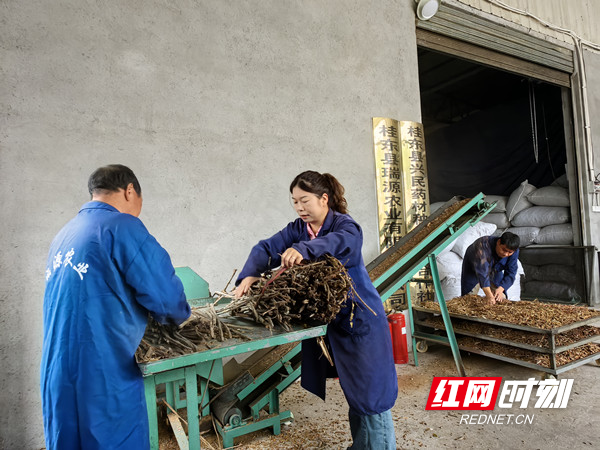
Li Yongfeng visited other TCM markets for study, and then she processed the fresh herbs to make the magnolol content higher than the pharmacopoeia standard, which without doubt increased the added value of the product.
As the processed Magnolia officinalis is more popular, its price is much higher, and accordingly the purchase price for fresh plants from farmers rises.
Through years of efforts in the processing of Chinese medicinal herbs, Li Yongfeng has led her team to obtain three national utility model patents on cultivation, processing and bark stripping of Magnolia officinalis.
Chinese source: rednet




